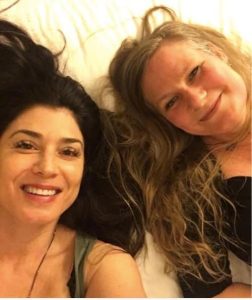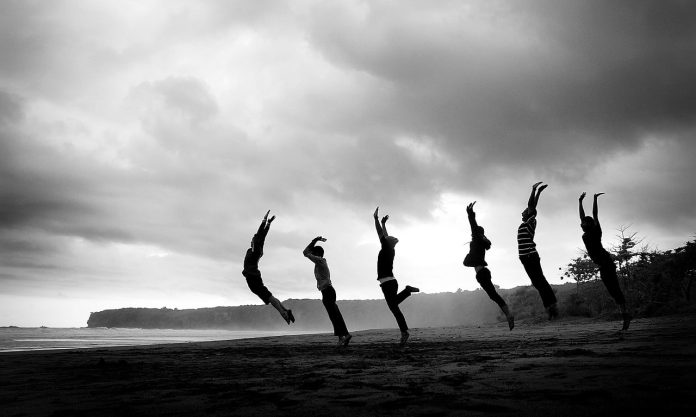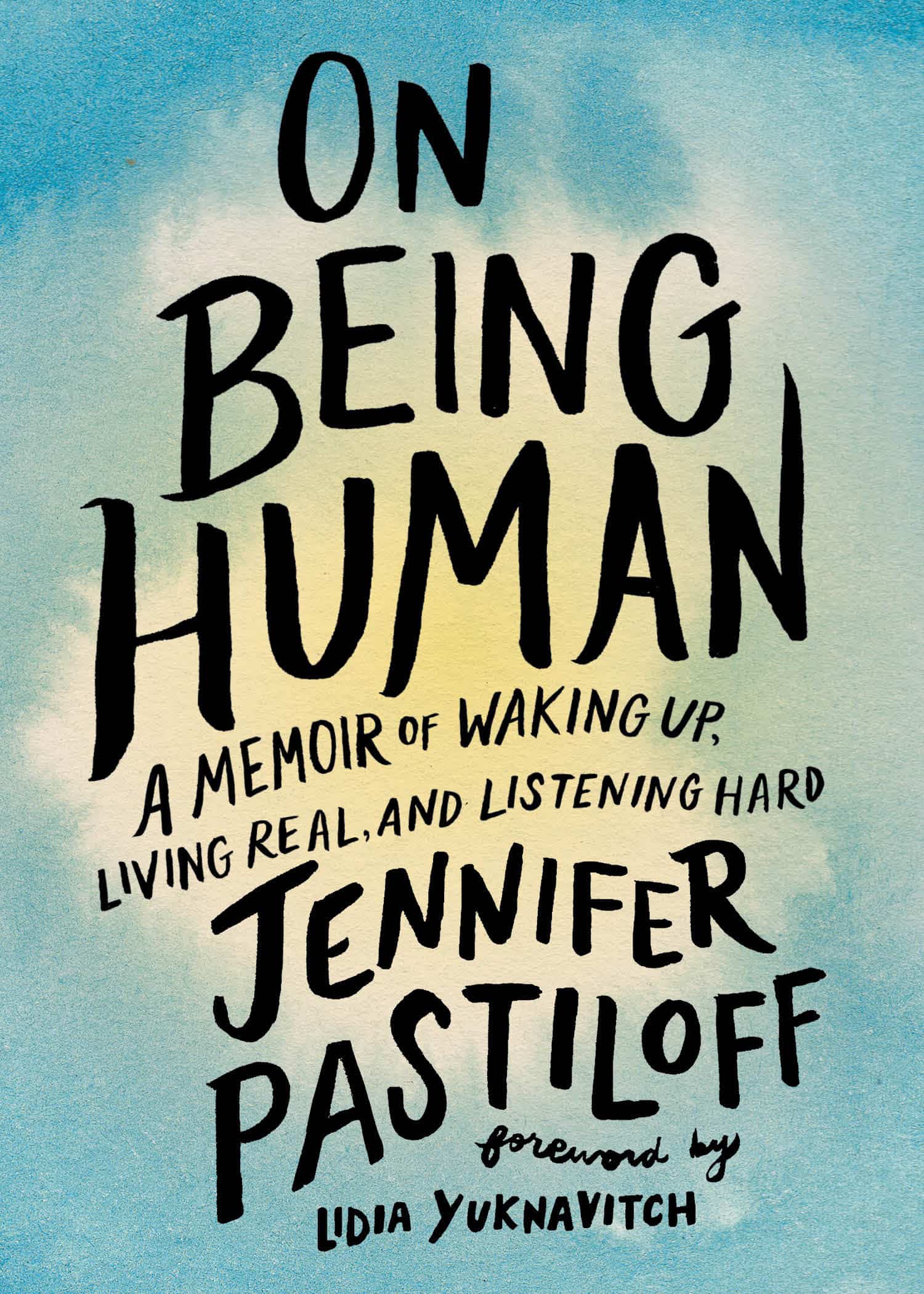Soaking in the tub on Christmas Eve, I studied my naked body. My two sons were on a trip with their father, and I live by myself, so I had plenty of time to reflect on the noticeable weight I had gained after a recent surgery. My breasts had grown larger and were pleasantly round with a fullness they hadn’t had for a very long time. My stomach and sides had grown thicker too. I considered some pros and cons of the weight gain. Pro: my butt was rounder, not as flat. Con: my butt was not as perky. Pro: my breasts were larger, pleasingly heavy when I weighed them in my hand. Con: I had a little pot-bellied tummy. Pro: I felt surprisingly more grounded in my body. Con: I had to buy new jeans.
In the past, I had always abdicated judgement of my body to others.
Now single, for the first time I was the only one experiencing my body; I was the only one who would decide if the changes were good or bad, ugly or beautiful. In the past, partners had taught me that a fit, trim body was acceptable and loveable, though they had said they would love me “even if” I gained weight, whatever that meant. Judgment of my body was for others, including my mother, for whom my body had never been quite right: for her, I had always been too heavy or too thin. Now, as I considered my new curves and softness, I was surprised at the lack of horror and shame I had always felt before when I had gained weight.
As I considered my new body, a word popped into my mind along with a question: Cherish. Do I cherish my body?
The thought surprised me: I had never thought about my body this way. Granted, two thoughts were grounding my appraisal in safe objectivity. First, having escaped an abusive relationship two years prior, I had no plans to date. Thus, no one would be able to judge or disapprove of my new curves. (It honestly didn’t occur to me that somebody out there might actually like them.) Second, it was not even January. I had plenty of time to “get ready” for swimsuit season. This last idea, that I had to slim down for summer, was a painful reminder that I still did apply a tyrannical “ideal” female body concept to myself, though I had never applied it to others. Nevertheless, I became stuck on the word “cherish” as applied to my body. This was a new idea, a new question. Did I cherish my body?
Could I cherish my body if there was no one else telling me it was beautiful?
Merriam-Webster’s Dictionary defines the word “cherish” in a couple of ways. The first I knew: a verb meaning to “hold dear” or “to feel or show affection for.” The second definition gave me pause, however, when I applied it to how I felt about my body. It read: “to keep or cultivate with care and affection.” Did I feel affection toward myself or my body? I looked up affection and found “tender attachment” and “fondness.” So, to cherish my body, I would need to keep or cultivate it with care, with tender attachment, with fondness. Did I do that? Could I do that?
In my forty-eight years I don’t think I have ever thought of my body as something I could cherish.
I had been proud of my body when I was in shape, thin and muscular, but that was a different thing. That pride had been grounded in approval from others and in fitting my body into that physical “ideal” that American culture forces upon women, an “ideal,” frankly, that more resembles a pre-pubescent boy than a full-grown woman. And during the times my body didn’t fit that impossible “ideal,” I savaged myself, both emotionally and physically.
When I was a teenager I was severely bulimic, hating myself, my body, and my large breasts.
No one told me that my figure was actually very reminiscent of movie stars like Sophia Loren. All I saw were the currently in-vogue stick-thin models and movie stars, and I would look in the mirror and dream of cutting off my breasts and stomach with a knife. I convinced my mother to get me breast reduction surgery when I was seventeen because I was so desperate to look thinner. At first, our insurance would not cover the surgery because my breasts were not large enough. So, I gained weight until they were. Neither the surgeon nor my mother should have proceeded under those circumstances, but I was insistent. It didn’t help that the surgeon promised my mother that if I had the surgery I would be much happier, just like all the other young women he had operated on in our town. The surgery went forward, and then I lost the extra weight, leaving me flat-chested, scarred, and unable to fully breast feed my future babies.
As far as my eating disorders, I finally stopped being bulimic in college when one night all I threw up was blood.
I knew at that point it was either stop or die. So, I stopped bingeing and throwing up, but in the following decades I went through various phases of dieting and exercising, some more intense than others. At certain points, I felt good about my body, comfortable going naked on nude beaches or in the locker room at the gym, but that was only when I was very thin. I found an easiness in being thin, and I could not let go of the fear that I would be judged for having an “unacceptable” body. For me, being thin was a point of pride and safety. My body was a thing, an asset, but suspect and untrustworthy: something to manage, to tame, and to force vigilantly, daily, into the right shape.
I can honestly say I never applied the same “acceptable body” rules to other people that I so mercilessly applied to myself.
I always found people of all shapes and sizes beautiful, and I have cherished other people’s bodies, whether they were lovers or family members, no matter their sizes or so-called imperfections. It never occurred to me to do otherwise. I saw only the people I loved, and I cherished them. But I never did, I never could, extend to myself that same generosity. Now I was beginning to wonder if I could be that generous with myself.
With January coming, it was time for gyms across America to hold their annual New Year’s Specials for all those who made resolutions to change their bodies for the supposed better. I knew that in January, the gym I used to attend regularly would be packed with new gym members. Women would line up to shower in the too-crowded locker rooms, and the women who worked out year-round would give each other grumpy looks of solidarity, their eyes saying: “just hang on until mid-February and most of them will be gone.” And most of them would be gone come February, just like in all the other years I worked out at that gym.
Little wonder so many would quit, given the gym’s huge TV monitors scrolling through images of young, thin, muscular “beautiful” people who looked nothing like the women who came to the gym in January year after year. Never mind that the women I saw working out in the gym looked more beautiful and more real to me than the oiled, coiffed, and fully waxed figures on the screens above us. And while for many women, at least part of the reason for joining the gym was to improve on health, I can say that, at least for me, the main reason for my workouts wasn’t because I wanted to be healthy. I wanted to be loveable, and I didn’t believe I could be loveable unless my body fit a certain mold. I did not love my body; it didn’t occur to me. And it most certainly didn’t occur to me to cherish my body.
Then, I got trapped in a marriage that almost killed me.
That ex-husband once said that he “cherished” me, that he cherished my mind, my spirit, and my body. We dated for a deceptively blissful year-and-a-half and then got married. Soon after that he became so abusive that I nearly lost my mind in the maze of gas-lighting, physical abuse, and shaming that our relationship had become. At one point this man who “cherished” my body choked me so hard I had a seizure. I often wonder now how I found the strength to leave that relationship. I can barely remember that time, having blocked most of it out, but I remember I had a will to live, some kind of deeper self-love that motivated me to leave, to survive. Perhaps that experience, which ended just two years ago, was the beginning of seeing myself in a different way.
I finally saw myself as someone worth saving for reasons beyond what someone else thought of me.
Looking back over the decades I am amazed at all my body and I have been through together, including eating disorders, abuse, sexual molestation when I was a child, alcohol and drug abuse and recovery, countless punishing workouts, diets, and breast surgery to be thinner. As I approach fifty years old, my view of my body is changing. At times, living alone as I do, I can fall into a trap of thinking it doesn’t matter if I don’t take care of my body, if my feet are dry and calloused, if my skin is rough, even if the dryness feels uncomfortable, because I’m the only one who sees these things. No one except for me will be touching me, and that can be an empty, lonely feeling indeed. But it can also be freeing, if I let it.
For the first time in my life, I am claiming my body as my own.
I’m no longer trying to force my body into a pleasing shape so someone else might come along and cherish it. In many ways, I’m getting to know and appreciate my body for the first time. It is an odd feeling, and I would be lying if I said I am completely free of the socially-ingrained distress at gaining some “extra” pounds. And yet, I am also seeing the sum of all my parts in a new way, a gentler way. So, I wonder: Can I cherish my body? Love my body unconditionally and without judgement as I have loved others? Can I love and cherish those parts of me that others have abused and used against me? Can I cherish these softening arms? These scarred breasts? These thighs? This wobbly stomach? Can I love my own hands, so callused and spotted with age? Can I look myself in the mirror and say: “I love you,” without feeling utterly awkward? As if saying “I love you” into the mirror would feel like being too intimate with myself. Is it even possible to be too intimate with oneself?
I’ve realized that perhaps, if I go slowly, gently, step-by-step, I can forge a path to truly cherishing my body.
I can begin with my hands, since they are the parts of me that I see most often doing the simple things I love to do: petting and grooming my dogs, typing, hugging my children, peeling an orange, holding a book. I can begin with saying thank you to my hands for what they can do. This does not feel too awkward. And I can say thank you to the other parts of me: thank you to my breasts for being able to at least partially breastfeed my sons, even after the surgery; thank you to my feet for carrying me all these years; thank you to my internal workings for keeping me alive, digesting my food, breathing, pumping blood to my cells; thank you to my eyes for seeing all the beauty around me; thank you to my mind for spinning my words together; thank you to my heart for the love and gratitude I feel for my loved ones. While I might not yet be able to look at my body and wholly, unreservedly say, “I cherish you unconditionally,” I do have a road map for getting there. I can learn how to care for my body, whatever shape it takes, with “tender affection.” I can hold my body “dear.” I can take my time, finally trusting my own judgement and listening to my own kinder, gentler voice. I can claim my right to cherish me, my body, on my own terms, according to no one else’s opinions but my own.
Jen’s book ON BEING HUMAN is available for pre-order here.



Love this so much. Thank you for these words.